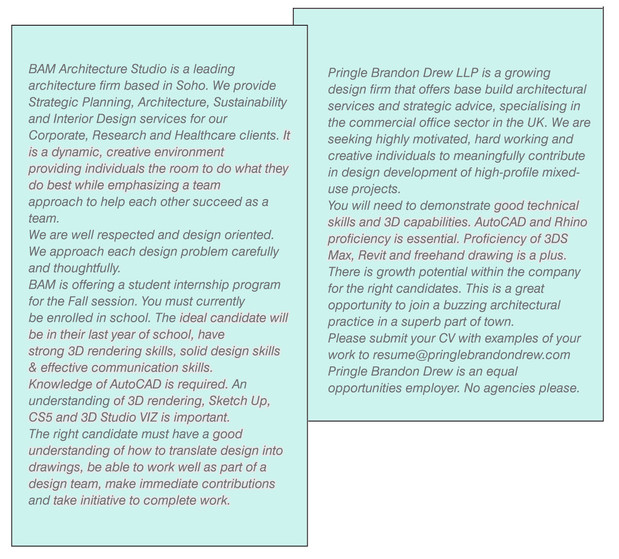Professional Applications in English for Architects
Unit 2. WORKING OUT SKILLS

2.1 ARCHITECTS' BACKGROUND
Architecture is the art, science and business of building. An architect is trained and experienced not only in the design and construction of the built environment, but also in endeavours ranging from conceptual problem-solving to project management. Today, architects are engaged in the challenging historic task of creating new buildings or retro-fitting existing structures and in participating broadly in the concerns and affairs of society, as well as many other multidisciplinary areas. This concern may range from furniture design to city form and from community involvement and social change to development economics or technical research. Today�s architect may practise as an individual or in a small, medium sized or large firm; the architect may be either self-employed or an employee; the architect may work for an institution, a development company, or a large organisation. The client may be a family, school board, corporation, housing authority or government or even a contractor. Special interest may lead to computer programming or to contract management.
Many architects develop their skills in traditional roles, but some are motivated to work in areas like social housing or community development. Architectural practices or individual architects may choose to specialise in areas like housing, hospital or educational facilities. An allrounder architect profile can be involved with many other work disciplines.
An architect is a professional who organises space. Architects design houses, office buildings, skyscrapers, landscapes...and nowadays a lot more in the scope of visual, graphic design, cyberspace architecture, new technologies where the language and communication of the image is a challenge. Architects are trained in many areas, from historic preservation and structural engineering to 3d design updated tools. Like any other degree, architects have completed university programmes and internships.
To be an architect requires a special range of qualifications such as design talent,
engineering ability, social awareness, etc. However the most important thing
is to have passion and motivation for his/her work: The most accomplished
architects are the ones who work in the field because they love it.
Passionate architects tendto have a tremendous
drive and work ethic, as well.
Job examples
Student Internship |
Architectural Assistant |
||
 |
|||
The most representative skills required in advertisements are:
� Imaginative and creative thinking skills.
� An ability to analyse and critically assess problems.
� An ability to see the big picture as well as giving attention to the smallest detail.
� An ability to communicate effectively.
� An understanding of historical, cultural and environmental concerns.
Through their professional work architects develop:
� A practical and technical understanding of building materials and elements, structures, construction and services.
� Coordination and interpersonal skills to manage a complex project team of consultants.
� Negotiation skills to resolve complex building issues.
� Lateral thinking skills to solve complex problems.
� Intellectual ability.
� Knowledge of art.
� Application of mathematical computations.
� Graphic design skills.
� Model making.
� Good communication skills.
� Understanding of, and experience in building construction.
� The enjoyment of details.
� Self confidence.
� Ability to learn (forever)
Architects have skills in the following:
� creativity
� spatial awareness
� architectural history
� architectural theory
� social systems
� structural systems
� construction methods
� material properties and interactions
� building services (plumbing electrical etc)
� building & planning regulations
� business management
� project management
� contract administration
� communication (written, images and speech)
Here are the top ten skills requested in advertisements
Passion for His/Her Work: The most accomplished architects are the ones who work in the field because they love it. Passionate architects tend to have a tremendous drive and work ethic, as well.
Good Communication Skills: A successful architect has excellent written and verbal communication skills and can hold effective discussions with clients and builders to ensure each party has sufficiently communicated their wants and needs for the project at hand.
Excellent Listening Skills: An architect must have superb listening skills in order to fully grasp what it is the client is after, as well as to effectively understand the needs of builders and other parties involved in executing an architect�s design.
Strong Drawing/Sketching Skills: A great architect must have high quality drawing and sketching skills, either via computer programs or by hand.
Excellent Sense of Design: Successful architects have an eye for good design and can translate ideas onto paper to show clients and builders.
Solid Technical Abilities: Successful architects are able to successfully integrate mechanical, electrical, and structural elements into their designs as well as account for the unique requirements of particular building materials.
Problem Solving: A successful architect must have sharp problem solving skills. They need to be able to identify problems as soon as they arise (or before they arise) and develop rapid solutions to address them.
Good Sense of Business: Architects should be keenly aware of the business side of the design world in order to develop practical design solutions.
Belief in Collaboration: Architects must be able to work in a team environment many designs are the work of more than one architect. The entire design-build process, as well, is a collaboration between architects, engineers, designers, builders...etc.
Project Visualization Ability: A great architect has a good sense of vision. They are able to visualize the end results through all steps of the designing and building processes.